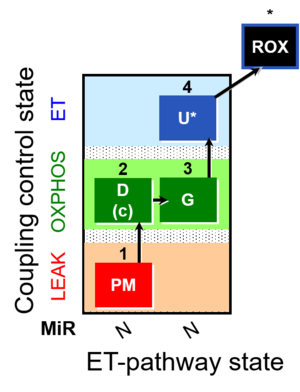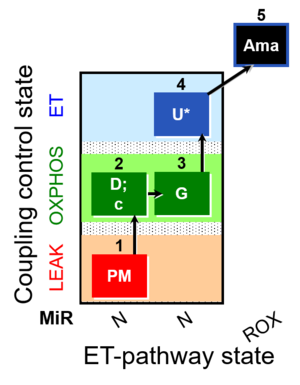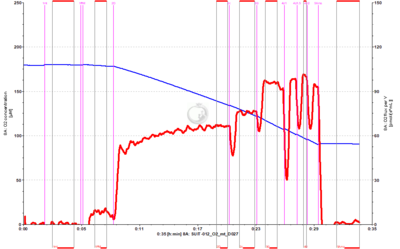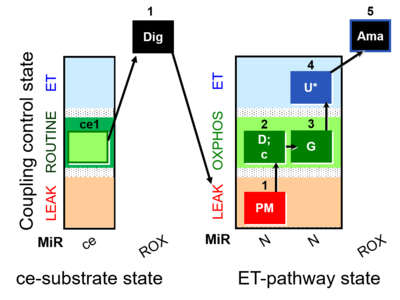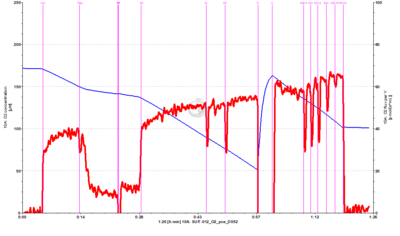Difference between revisions of "SUIT-012"
From Bioblast
| (37 intermediate revisions by 8 users not shown) | |||
| Line 1: | Line 1: | ||
{{MitoPedia | {{MitoPedia | ||
|abbr= | |abbr=PM+G_OXPHOS | ||
|description=[[File:1PM;2D;3G;4U-.png|300px]] | |description=[[File:1PM;2D;3G;4U-.png|300px]] | ||
|info='''A''' [[ | |info='''A: Coupling control ([[LEAK respiration|''L'']]-[[Oxidative phosphorylation| ''P'']]-[[ET capacity| ''E'']]) with NADH-linked substrates ([[PM-pathway control state|PM]] and PGM)''' | ||
}} | }} | ||
::: '''[[ | ::: '''[[SUIT protocol pattern]]:''' 1PM;2D;2c;3G;4U- | ||
The SUIT-012 protocols specifically focus on assessing the coupling control ([[LEAK respiration|''L'']]-[[Oxidative phosphorylation| ''P'']]-[[ET capacity| ''E'']]) with NADH-linked substrates ([[PM-pathway control state|PM]] and [[PGM]]). Addition of [[Glutamate|G]] enables evaluating the contribution of this substrate in NADH-supported [[Oxidative phosphorylation| OXPHOS]] respiration, which may be relevant in the presence of [[glutamate-anaplerotic pathway control state]]. SUIT-012 can be extended with the CIV assay module. | |||
__TOC__ | __TOC__ | ||
Communicated by [[Cardoso | Communicated by [[Cardoso LHD]], [[Doerrier C]], [[Huete-Ortega M]], [[Gnaiger E]] (last update 2019-06-05) | ||
== Specific SUIT protocols == | == Specific SUIT protocols == | ||
=== SUIT-012 O2 mt D027 === | |||
[[File:1PM;2D;2c;3G;4U;5Ama.png|300px]] | [[File:1PM;2D;2c;3G;4U;5Ama.png|300px]] | ||
* [[SUIT-012 O2 mt D027]] for isolated mitochondria | [[File:D027_O2_traces.png|400px]] | ||
* [[SUIT-012 O2 mt D027]] for mitochondrial preparations (isolated mitochondria, tissue homogenate and permeabilized cells) | |||
=== SUIT-012 O2 ce-pce D052 === | |||
[[File:ce1;1Dig;1PM;2D;2c;3G;4U;5Ama.png|400px]] | [[File:ce1;1Dig;1PM;2D;2c;3G;4U;5Ama.png|400px]] | ||
* [[SUIT-012 O2 pce | [[File:D052_O2_traces.png|400px]] | ||
* [[SUIT-012 O2 ce-pce D052]] for permeabilized cells | |||
{{Template:SUIT-012}} | |||
== Strengths and limitations == | |||
:::+ This protocol allows to evaluate the function of the TCA cycle without the involvement of the [[complex II]] ([[Succinate pathway control state| S-pathway]]). It is thus useful to understand the contribution and the activity of the dehydrogenases providing NADH. | |||
:::+ Mitochondrial outer membrane integrity can be measured with the addition of [[cytochrome c]]. Application of the [[cytochrome c]] test early in the protocol ensures comparability of all states in case of any effect of cytochrome ''c''. | |||
:::+ Reasonable duration of the experiment. | |||
:::+ This protocol can be extended with the Complex IV module, which can prolong the experimental time with ~30 min. | |||
:::+ GM and PM yield typically identical fluxes in human skeletal muscle fibres. However, PM is the superior alternative to GM: the fraction of the [[NADH Electron transfer-pathway state| N-pathway]] is lower and of the [[Succinate pathway control state| S-pathway]] is higher with GM compared to PM (GMP is inhibited by the CII inhibitor malonic acid to a larger extent than PMP). PM, therefore, yields a more sensitive assay for the diagnosis of injuries in the N-pathway, since an impairment of N-pathway capacity can be compensated partially by activation of the S-pathway. This is an advantage compared to [[SUIT-011]] for diagnosis of N-capacity. | |||
:::- Careful washing is required after the experiment to avoid carry-over of inhibitors and uncoupler. | |||
== Compare SUIT protocols == | |||
::::* [[SUIT-008]]: 1PM;2D;3G;4S;5U-; longer version that also analyses S-pathway. | |||
::::* [[SUIT-006]]: 1X;2D;3Omy;4U-; coupling control protocol with only one combination of substrates (''e.g.'' 1PM;2D;3Omy;4U-). | |||
== References == | == References == | ||
{{#ask:[[Category:Publications]] [[Instrument and method::O2k-Protocol]] [[Additional label::SUIT-012]] | {{#ask:[[Category:Publications]] [[Instrument and method::O2k-Protocol]] [[Additional label::SUIT-012]] | ||
| Line 25: | Line 52: | ||
|order=descending | |order=descending | ||
}} | }} | ||
{{MitoPedia concepts | {{MitoPedia concepts | ||
|mitopedia concept=MiP concept, SUIT protocol, Recommended | |mitopedia concept=MiP concept, SUIT protocol, Recommended | ||
Latest revision as of 23:57, 12 April 2021
Description
Abbreviation: PM+G_OXPHOS
Reference: A: Coupling control (L- P- E) with NADH-linked substrates (PM and PGM)
- SUIT protocol pattern: 1PM;2D;2c;3G;4U-
The SUIT-012 protocols specifically focus on assessing the coupling control (L- P- E) with NADH-linked substrates (PM and PGM). Addition of G enables evaluating the contribution of this substrate in NADH-supported OXPHOS respiration, which may be relevant in the presence of glutamate-anaplerotic pathway control state. SUIT-012 can be extended with the CIV assay module.
Communicated by Cardoso LHD, Doerrier C, Huete-Ortega M, Gnaiger E (last update 2019-06-05)
Specific SUIT protocols
SUIT-012 O2 mt D027
- SUIT-012 O2 mt D027 for mitochondrial preparations (isolated mitochondria, tissue homogenate and permeabilized cells)
SUIT-012 O2 ce-pce D052
- SUIT-012 O2 ce-pce D052 for permeabilized cells
Steps and respiratory states
| Step | State | Pathway | Q-junction | Comment - Events (E) and Marks (M) |
|---|---|---|---|---|
| 1PM | PML(n) | N | CI | 1PM
|
| 2D | PMP | N | CI | 1PM;2D
|
| 2c | PMcP | N | CI | 1PM;2D;2c
|
| 3G | PGMP | N | CI | 1PM;2D;2c;3G
|
| 4U | PGME | N | CI | 1PM;2D;2c;3G;4U
|
| 5Ama | ROX | 1PM;2D;2c;3G;4U;5Ama
|
| Step | Respiratory state | Pathway control | ET-Complex | Comment |
|---|---|---|---|---|
| ## AsTm | AsTmE | CIV | CIV | |
| ## Azd | CHB |
- Bioblast links: SUIT protocols - >>>>>>> - Click on [Expand] or [Collapse] - >>>>>>>
- Coupling control
- Pathway control
- Main fuel substrates
- » Glutamate, G
- » Glycerophosphate, Gp
- » Malate, M
- » Octanoylcarnitine, Oct
- » Pyruvate, P
- » Succinate, S
- Main fuel substrates
- Glossary
Strengths and limitations
- + This protocol allows to evaluate the function of the TCA cycle without the involvement of the complex II ( S-pathway). It is thus useful to understand the contribution and the activity of the dehydrogenases providing NADH.
- + Mitochondrial outer membrane integrity can be measured with the addition of cytochrome c. Application of the cytochrome c test early in the protocol ensures comparability of all states in case of any effect of cytochrome c.
- + Reasonable duration of the experiment.
- + This protocol can be extended with the Complex IV module, which can prolong the experimental time with ~30 min.
- + GM and PM yield typically identical fluxes in human skeletal muscle fibres. However, PM is the superior alternative to GM: the fraction of the N-pathway is lower and of the S-pathway is higher with GM compared to PM (GMP is inhibited by the CII inhibitor malonic acid to a larger extent than PMP). PM, therefore, yields a more sensitive assay for the diagnosis of injuries in the N-pathway, since an impairment of N-pathway capacity can be compensated partially by activation of the S-pathway. This is an advantage compared to SUIT-011 for diagnosis of N-capacity.
- - Careful washing is required after the experiment to avoid carry-over of inhibitors and uncoupler.
Compare SUIT protocols
References
MitoPedia concepts: MiP concept, SUIT protocol, Recommended
MitoPedia methods:
Respirometry

